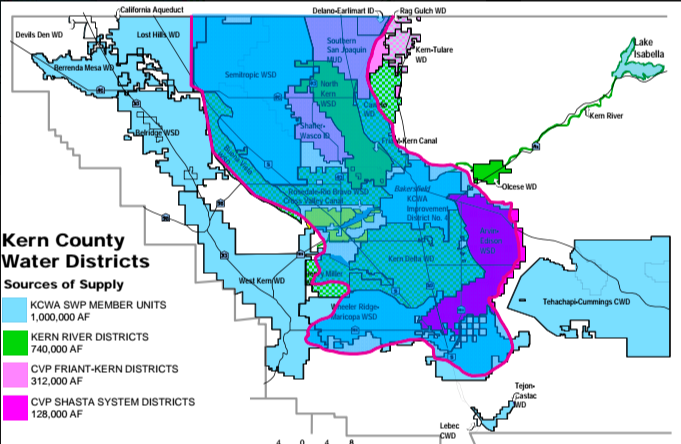
An irrigation canal pumping water. (Photo: Straight 8 Photography/Shutterstock)
Bring Back the Kern v. City of Bakersfield: Surface vs. Groundwater Regulation Post-SGMA
Surface water diversions, including groundwater recharge, remain subject to independent constitutional and public trust mandates
By Thierry Montoya, May 6, 2025 10:50 am
Introduction, Bring Back the Kern v. City of Bakersfield
The California Court of Appeal’s recent decision in Bring Back the Kern v. City of Bakersfield, 2025 WL 984395 (BBK), provides an instructive lens for understanding the evolving interplay between surface water diversions and groundwater regulation under the Sustainable Groundwater Management Act (SGMA). Although BBK was not decided specifically on SGMA grounds—focusing instead on Fish and Game Code § 5937 and constitutional reasonable use principles—it has significant implications for Groundwater Sustainability Agencies (GSAs) as they implement Groundwater Sustainability Plans (GSPs). Bring Back the Kern v. City of Bakersfield notably underscores the constitutional requirement of reasonableness, which must inform all water uses, including groundwater recharge. This article explores Bring Back the Kern v. City of Bakersfield’s key holdings and analyzes their potential impact on future groundwater management strategies under SGMA.
Background: Kern River Diversions
In Bring Back the Kern v. City of Bakersfield, environmental plaintiffs challenged Bakersfield’s historic practice of diverting Kern River flows into unlined canals and recharge basins, alleging these diversions depleted river segments, thus violating Fish and Game Code § 5937 and undermining public trust resources. Initially, the trial court agreed with the plaintiffs and imposed a preliminary injunction mandating restored river flows to support fish habitats.
However, the Fifth District Court of Appeal reversed this decision, holding that the trial court had inadequately applied the constitutional standard of reasonable use under Article X, § 2 of the California Constitution. The appellate court emphasized that all water uses—whether ecological or consumptive—must be evaluated against this constitutional principle, rejecting any automatic prioritization of either environmental or recharge uses. Instead, it advocated for a balanced, constitutionally sound approach to water management.
Groundwater Extraction vs. Surface Water Diversion: Separate Legal Regimes
California historically manages groundwater and surface water through distinct legal frameworks. Groundwater extraction, traditionally subject to minimal oversight, now falls primarily under SGMA, enacted in 2014 to address significant groundwater depletion and related adverse effects, including reduced surface water connectivity. SGMA mandates that local Groundwater Sustainability Agencies prepare and implement Groundwater Sustainability Plans to achieve sustainable groundwater management, explicitly addressing practices causing significant adverse impacts.
Conversely, surface water diversions remain governed by a well-established system of appropriative rights administered by the State Water Resources Control Board. Even beneficial uses such as groundwater recharge must comply with valid water rights, environmental regulations, and constitutional reasonable use principles.
Bring Back the Kern v. City of Bakersfield reinforces this legal distinction, emphasizing that surface water diversions—including those for groundwater recharge—remain subject to independent constitutional and public trust mandates.
Implications for Surface-Groundwater Coordination Under SGMA
Although Bring Back the Kern v. City of Bakersfield was not litigated under SGMA, its implications for Groundwater Sustainability Agencies coordinating groundwater recharge projects within Groundwater Sustainability Plans are significant. The decision’s insistence on a reasonableness test for all water uses suggests Groundwater Sustainability Agencies must scrutinize recharge projects, especially those involving significant surface water diversions. Projects diminishing downstream flows and harming ecological or public trust resources may fail constitutional scrutiny, even if beneficial for groundwater recharge.
Post-Bring Back the Kern v. City of Bakersfield, Groundwater Sustainability Agencies must proactively evaluate recharge projects against constitutional standards, promoting integrated management approaches that jointly consider groundwater sustainability and surface water health. This approach necessitates detailed environmental and constitutional assessments within Groundwater Sustainability Plan frameworks, balancing groundwater recharge objectives against potential ecological harm.
CEQA Considerations for Groundwater Recharge Projects
Bring Back the Kern v. City of Bakersfield’s holding influences how the California Environmental Quality Act (CEQA) applies to groundwater recharge projects by explicitly requiring that all water uses undergo a reasonableness analysis. Consequently, a proposed recharge project diverting stream flow to artificially recharge a basin—thereby significantly reducing or entirely halting downstream flows and creating detrimental environmental effects—would necessitate a rigorous CEQA analysis informed by Bring Back the Kern v. City of Bakersfield’s reasonableness standard. Groundwater Sustainability Agencies must therefore actively evaluate alternative projects or management actions capable of achieving recharge goals while imposing fewer environmental impacts, aligning both with CEQA requirements and Bring Back the Kern v. City of Bakersfield‘s constitutional reasonableness mandate.
Conclusion
Although grounded in constitutional and public trust doctrines and not SGMA, the Bring Back the Kern decision significantly impacts groundwater sustainability planning. By reinforcing the fundamental constitutional principle of reasonableness, Bring Back the Kern v. City of Bakersfield implicitly mandates Groundwater Sustainability Agencies to rigorously evaluate and justify groundwater recharge activities within their Groundwater Sustainability Plans. Moving forward, integrating environmental and constitutional considerations into groundwater management decisions will ensure balanced, sustainable outcomes that harmonize groundwater recharge efforts with surface water ecosystem health, advancing California towards a genuinely integrated water management framework.







